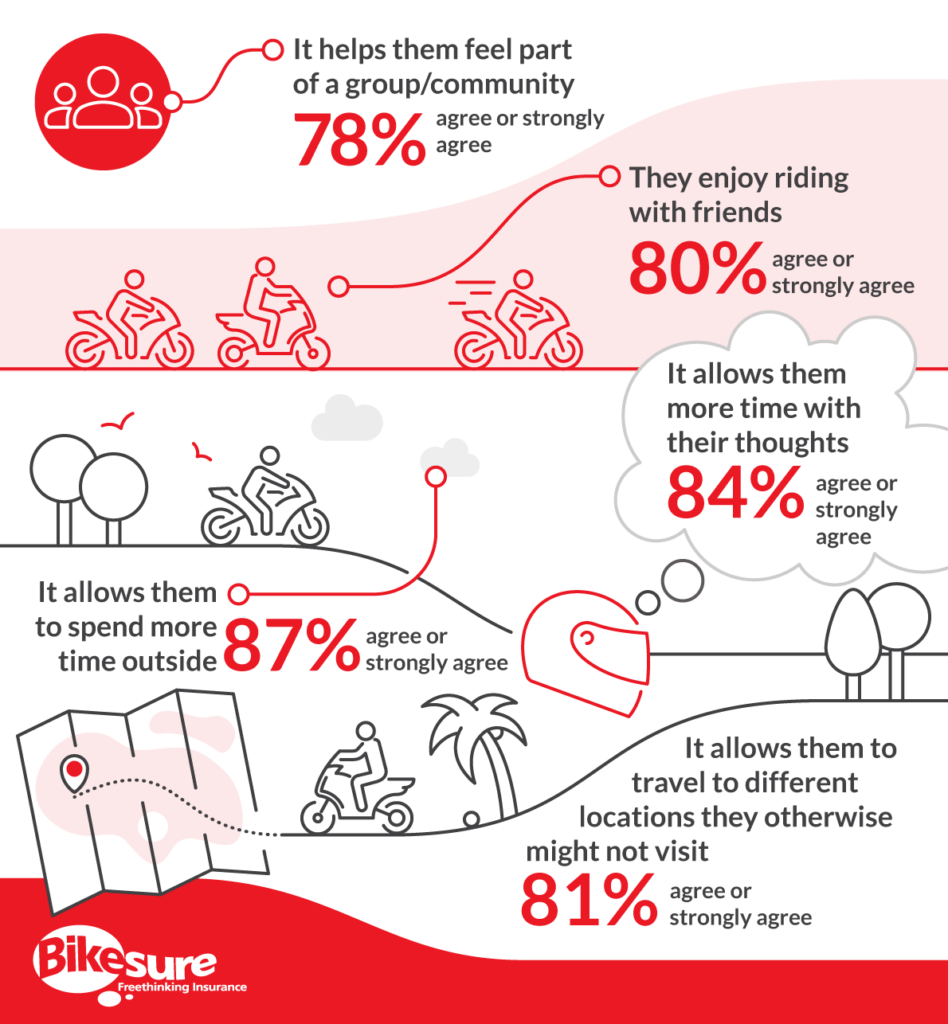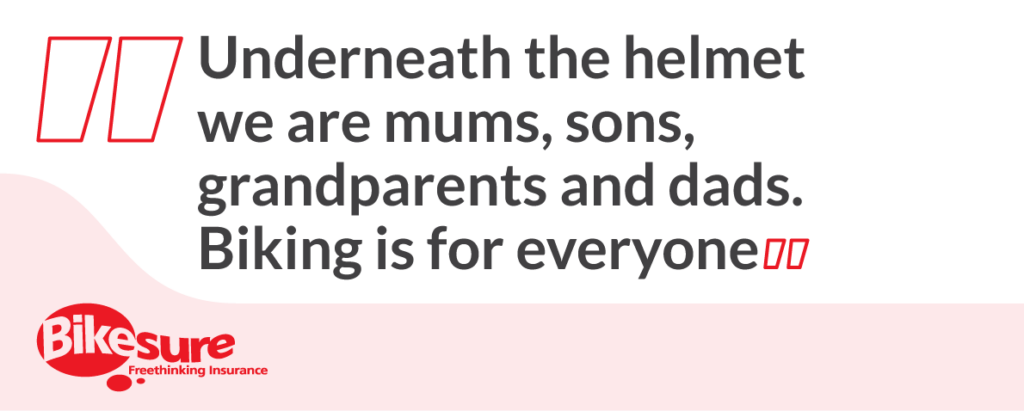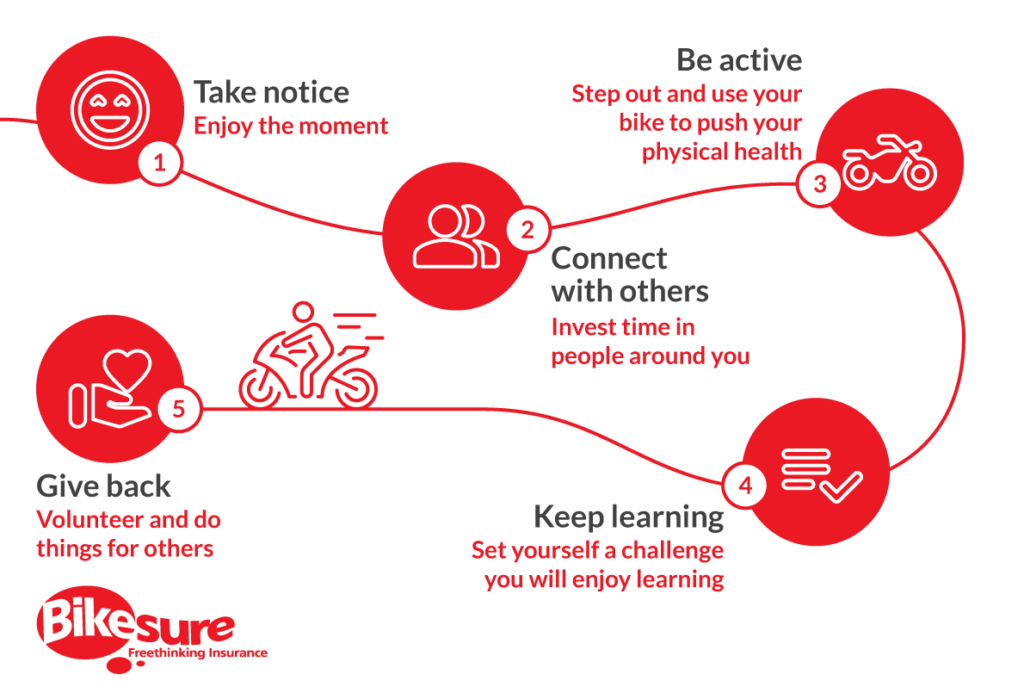Motorcycling for mental health: How being on the road can help your mental health

While there are many approaches to improving mental wellbeing, one you may not have considered before is motorcycling.
A recent Bikesure survey found that 78% of bikers would recommend motorcycling to friends, colleagues, or family suffering from mental health issues. This figure remains constant across age groups and genders, suggesting that the wellbeing benefits can be enjoyed by everyone.
90% of motorcyclists surveyed said that they believe that motorcycling has a positive effect on their mental health and wellbeing. While 62% said they regularly or occasionally experienced poor mental health, their passion and the motorcycling community directly contributes to improving their mental health.
It seems that the word is getting out beyond biking communities. According to the Department for Transport’s Road Traffic statistics, annual motorcycle and scooter use on British roads has increased significantly. By 2022 it had moved beyond pre-pandemic levels and hit the highest usage since 2016.
In this article we talk to Paul Oxborough, founder and chairperson of the charity Mental Health Motorbike to discuss the mental health benefits of motorcycling – from physical exercise and spending time outdoors to increased interactions as part of a welcoming community.
Nine in ten riders report positive effects on their wellbeing

Among the many benefits motorcycling can have on mental health, the most popular in the survey were those that allow riders to find some space to be alone. 87% of participants said they benefit from spending more time outside and a similar figure, 84%, said they enjoy the ability to spend more time with their own thoughts – just 2% said they did not enjoy the solitude that riding provides.
More than four out of five (81%) felt that a major positive is the freedom and sense of exploration motorcycling provides, travelling to new places and visiting locations they might otherwise not have visited.
Community and friendship play an important role in positive mental health, encouraging people to talk openly and not feel like they are isolated or alone. 78% of bikers are aware of this benefit, saying that riding makes them feel like they are part of a group, while 80% enjoy riding with friends.
From these combined figures, it is clear that a majority of riders agreed with multiple statements, demonstrating how powerful a tool motorcycling can be for resolving all kinds of mental health concerns.
Getting out on the open road can be exhilarating and cathartic, giving bikers space to themselves, a break from technology and time away from daily routines. In doing so, they will also benefit from the physicality of controlling a motorbike at high speeds. Motorcycling is an excellent form of exercise that can improve core strength and develop muscles in the back and legs – all of which can have a positive impact on overall health.
“Riding a motorbike is very unique, it has inherent dangers by the fact it is two wheels that needs to be balanced when moving, so you need to be in the zone every time you’re out on your bike, this creates a unique level of hyperfocus. You don’t have the time to be thinking about problems yesterday or tomorrow. The exhilaration of the sheer speed, power and capability of bikes releases lots of endorphins”, said Paul Oxborough.
“Many bikers who have a good ride out on their bikes say that they are in a much better headspace when they get off that bike.”
More than half of riders discuss mental health concerns in their communities
Of all the benefits motorcyclists find in their bikes and the community around them, one of the most valuable is the ability to talk openly about mental health as this can contribute towards reducing stigma and eliminating stereotypes, helping others and building strong relationships.
55% of riders surveyed said they discuss their own and others’ mental health concerns with fellow riders, showing that motorcycling communities are safe spaces with a high level of openness and support for those with issues. Out of the 62% who said they suffer from mental health challenges, 89% are now turning to fellow enthusiasts within the biking community for emotional support.
While it is encouraging that just 21% said that they do not discuss mental health, these people also need to be supported. If you do not feel comfortable talking openly there are a range of resources available to you including:
Support is also available from within the motorcycling community. Mental Health Motorbike is a national charity that is focused on supporting and improving the mental wellbeing of bikers in the UK and can direct you to support, mental health training and resources.
Raising awareness of mental health is a key focus and MHM is working hard to reach out, attending nearly 90 face-to-face events and presentations by July 2023 and continuing to encourage inclusion and diversity among its members. Their online peer support group has over 2,500 active members and in 2023 the charity aims to train 500 people in mental health first aid, having already trained 50 race marshals.
“In our experience there has been an increase of mental health issues. There is a big hangover left from the Covid pandemic and we have seen increased anxiety and social issues as a result and the cost of living crisis.” Said Paul Oxborough. “Life is hard at the moment, but mental health is much more talked about than it used to be. This works in our favour because one of Mental Health Motorbike’s aims is to normalise this discussion and break down the stigma associated with mental health. Our job is to create safe space for people to get some support when they need to discuss the effect it has on them.”

Two thirds of riders feel negative stereotypes are shifting
Looking at the survey’s findings it is clear that it is not just the act of riding a motorcycle that is cathartic, but the unique combination of personal space and community it provides. As more people discover motorcycling, the community is growing and becoming more inclusive. 65% said that they feel negative stereotypes around bikers are starting to shift as the community broadens.
However you come to biking and even if you have been riding for years, there are still a wide range of ways you can enrich your experience and increase the well-being benefits you experience. For example, why not try setting personal challenges, helping you to improve your health as you discover new locations and develop your abilities on a motorcycle?

Mental Health Motorbike suggests using the following five steps to improve wellbeing when biking: Take notice, connect with others, be active, keep learning and give back.
“Without a shadow of a doubt motorcycling is one of the greatest experiences you will have.” Said Paul Oxborough. “Your learning is never ending on a bike, it ticks so many boxes. You are in your own headspace whilst driving, but then when you slow down and park the first thing you do is look for other riders and by the time you get off your motorbike you are already talking to them. The ice has been broken through the use of the motorbike. You can arrange to meet friends at a location and then go on unique journeys together. It is very different to doing it in a car. You will also notice if you see a motorbike broken down at the side of the road other bikers will always stop to help.”
“Underneath the helmet we are mums, sons, grandparents and dads. Biking is for everyone.”
Get your bike on the road and boost your wellbeing
Whether you are getting your first bike or your 50th, Bikesure will have a bike insurance policy to match your needs and get you out on the road. Call 0330 123 1028 for a swift no-hassle quote or book a callback at a time that suits you.






